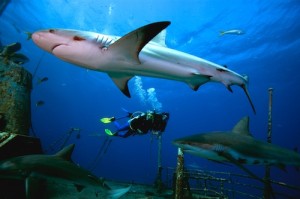Shark Conservation
Sharks are amazing creatures. Unfortunately, they have earned a bad reputation. Sharks rarely attack humans. When attacks have occurred, they are most likely due to the shark confusing the human as food. Movies have portrayed sharks as man killers, but you’re much more likely to be killed by a deer or cow than a shark.

Sharks are apex predators. They keep the oceans healthy by removing sick aquatic animals and keeping fish populations under control. Shark Conservation is essential for ocean sustainability.
Why do sharks seem so menacing? Probably because they have a rather grim appearance and have a somewhat blank appearance. Think about it: sharks are one of the oldest known families of animals. They’ve not changed much and relative to the ‘cute’ and mostly harmless fish you might have in a home aquarium, they are predators. [Keep in mind that many fish in home aquariums can sting or bite, but they are treated as pets.]
Sharks aren’t just a predator, they are an apex predator for the oceans. That means they sit at the top of the food chain or food web. The only predator they should worry about is man. Apex predators, whether in the sea or on land, play a key role in keeping ecosystems in balance and keeping them healthy. How does that work? Apex predators keep other predators in check, often making sure that other predators don’t overwhelm and destroy or disrupt an ecosystem. Apex predators also remove sick animals from the ecosystem, which helps curb the spread of disease.
Sharks are incredibly vulnerable. Okay, I just said they were an apex predator. How can they be vulnerable? Unlike many fish species that spawn in huge numbers, sharks live a long time. They mature later in life and they don’t breed in the numbers that fish lower down in the food web do. When juvenile sharks are killed before reaching maturity and spawning, they numbers of sharks start to dwindle. Some shark species are threatened by extinction due to overfishing and fishing practices that catch sharks as bycatch. Sharks have been overfished for their fins, to make shark fin soup, a delicacy in Asia. Many restaurants have stopped making shark fin soup because of public pressure to stop the process of shark finning. When sharks are caught for their fins, they are brought onto the boat, their fins are cut off and the shark is dropped back in the water to die. A grisly and wasteful approach to fishing. Shark Conservation through your help as a diver is essential.
Sharks are also threatened by public or government overreaction. A recent shark attack in Australian waters resulted in the government calling for a shark cull: basically catching and killing sharks in the area. As it was, the person attacked was probably in waters known to have sharks and the person probably appeared as food to the shark. As a diver and member of the public, tell your elected officials that Shark Conservation is a priority and they should focus on the science not their unjustified fear of sharks.
Taking the Shark Conservation Distinctive Specialty course will enhance your knowledge of sharks and their behavior. You’ll learn more details of how they are threatened and learn ways you can help conserve sharks and promote marine health by keeping these apex predators. You’ll make two dives with your instructor. If you’re lucking enough to see sharks, you’ll passively observe their behavior. If not, you’ll look at ways that the sharks may be threatened in that environment.
As divers, we’re natural ambassadors and advocates for aquatic life. Do your part to help conserve sharks for aquatic health and future generations of divers: sign up for the Shark Conservation Specialty today.
Learn more about Sharks in Peril at projectaware.org